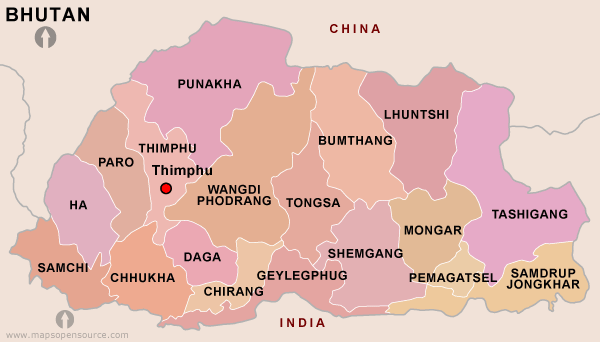
Marie Holzman
It’s hard not to fall under the spell of Pawo Choyning Dorji’s The Monk and the Gun (streaming on Apple TV+), an acclaimed ode to peace and the lives of the humble. The action takes place in Bhutan, when the resigning king organizes a “blank” ballot in 2006 to teach his people how to vote in view of the upcoming first real parliamentary elections. This, is the only historical fact of the movie; the rest is a fable.
Landlocked between China and India, Bhutan jealously guards its independence, its image, and its culture. It has earned a reputation as a paradise on earth, having enshrined the notion of “gross national happiness” in its constitution in 2008 – a reputation that will be reinforced by the film’s success. Who, indeed, would want to disturb this apparent harmony? Why impose political parties on these sincere Buddhists, who have remained simple in their mountains, parties that would disrupt their peaceful social life with unnecessary conflict? Who wouldn’t be tempted, after discovering this Eden untouched by the defects of modernity, to reproach the Western Eve for handing the Himalayan Adam the poisoned apple of her model? Who would dispute the fact that wars, digital surveillance, and pollution accompany her?
But this movie is like all fairy tales. Historical facts contradict the idyllic image that the script wants to impose. So, let’s go back a few years to better judge the time of the story.
In 1974, King Jigme Singye Wangchuck imposed Bhutanese culture on all the country’s ethnic groups; in 1985, the Lhotshampas of the southern plains, of Nepalese origin, were stripped of their citizenship. Their language was banned and Bhutanese dress was imposed.
Ill-treated minorities
Some 100,000 of them fled to Nepal or India. There, they led a miserable life in camps, not noticed by anyone, and struggled in vain to regain their land. As for Tibetan refugees, who share the language and religion of Bhutan, they were forced to take Bhutanese nationality in 1979. Many fled. This tragic story emerges under the surface of the fiction, but so allusively that few filmgoers will stop to think about it. The Bhutanese monk who carries around the old rifle recounts with a smile that the weapon was once used to shoot Tibetans, but he is careful not to explain the reasons for those fratricidal wars. He is also careful to point out that Tibetans in exile are crying out for freedom and democracy.
The demand for democracy is not exogenous, as The Monk and the Gun would have us believe, but endogenous. That’s because reality is far from rosy in the kingdom of happiness. Reporters Without Borders (RSF) placed Bhutan 147th out of 180 countries in its 2023 World Press Freedom Index: “In the land of “gross national happiness,” self-censorship is one of the main problems: many journalists avoid covering sensitive issues for fear of appearing to challenge the social order. In this predominantly Buddhist country, the media rarely refer to the situation of the Lhotshampa.”
Human Rights Watch has identified 37 political prisoners who had called for democracy in the 1990s and 2000s, long before the 2008 elections. Many were sentenced to life imprisonment. The most famous, Monger, released after 29 years of imprisonment, described the very difficult living conditions: hunger, lack of medical care, the impossibility of contacting family, etc.
The film tries to give credence to the idea that it is the population itself that rejects democracy, or rather (however unlikely this holy ignorance may be in our hyper-connected world) that it has never heard of the strange custom of our elections. The caricature of the West, reduced to a few clichés (Coca-Cola, James Bond, drug trafficking), completes the picture. As for the American looking for a Civil War rifle for a collector of old armor, he is perfectly ridiculous.
Chinese billionaires
Beneath its air of candor, the film is a full-scale attack on democracy. But who benefits from the crime? The credits tell us that the production is Chinese. The producer, Hsu Feng, is a former Taiwanese actress who married Chinese property tycoon Tang Junnian in 1999 and went into the Chinese film business after her husband’s death. Line producer Zhang Xin is a Chinese billionaire who married property developer Pan Shiyi in 1995. They founded the company SOHO, a real estate giant headquartered in Beijing. Although not a career politician, Zhang belongs to the “red elite” and contributes, in her own way, to China’s soft power. Now, destabilizing our democratic systems, and making the Chinese dictatorship the model for a new world order bringing well-being and wealth to all those who accept its hegemony, is indeed Xi Jinping’s objective.
In place of the decolonial reading that serves as the universal interpretation today, I believe we need to substitute another reading, one that is disenchanted and geopolitical, less seductive no doubt, but also less naive.
source : lemonde
